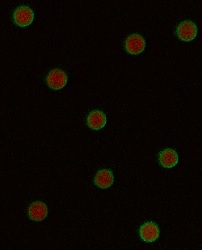 |
| Self-assembling time-release nanoparticles--Courtesy of University of Melbourne |
A self-assembling material could enable the improved delivery of everything from vaccines to treatments for cancer, cardiovascular disease and neurological conditions, University of Melbourne researchers have determined.
Their "engineered particle system"--essentially nanoengineered films or capsules--are designed to be assembled pretty quickly from minerals and nutrients, with particular physical and chemical properties depending on the particular drug or function in mind. In turn, these substances can be built to break down in different environments or conditions--an update on the whole "timed-release" concept. What's more, the Melbourne team says its new assembly process is inexpensive and easy to scale up. While more testing is needed, their film/capsule material also appears to be generally non-toxic, with relevance not just for drug delivery but other biological and environmental uses.
Nanoengineering is a drug-delivery buzzword these days. Lead researcher Frank Caruso of the University of Melbourne's Department of Chemical and Biomolecular Engineering notes in a statement that nanoengineered capsules, for example, are drawing major attention as drug carriers. Here's why: If successful, they'd allow for the improvement and even customization of drug delivery. Such technology could boost a treatment's effectiveness and also allow for specific treatments for particular patients.
The Melbourne team's advance competes with a number of nanoengineering projects in the pipeline at various drug developers. BIND Biosciences, for example, is developing cancer therapeutics dubbed Accurins, which are designed to selectively build up at the disease site. Selecta Biosciences, in turn is working on nanoparticle vaccines, with the idea that nanoparticle technology can boost drug delivery effectiveness. And then there's Cerulean Pharma, which is focused on nanotechnology to help boost the safety and effectiveness of both market- and development-stage drugs.
Caruso's background includes a focus on engineered materials, polymer science, biomolecular engineering and molecular recognition. According to the University of Melbourne, he's also an Australian Research Council Australian Laureate Fellow. Details of the work by Caruso and his team are published in the journal Science.
- read the release
- here's the journal abstract